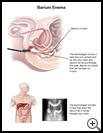
Barium Enema
________________________________________________________________________
KEY POINTS
- A barium enema is a procedure that uses X-rays and barium to look for problems in your child’s intestines.
- Ask your provider how long it will take to recover and how to take care of your child at home.
- Make sure you know what symptoms or problems you should watch for and what to do if your child has them.
________________________________________________________________________
What is a barium enema?
A barium enema is a procedure that uses X-rays and barium to examine your child’s large intestine (colon) and rectum. Barium is a liquid that can be seen on X-rays.
This procedure is also called a lower gastrointestinal (GI) exam or lower GI.
When is it used?
This procedure is used to look for problems in your child’s intestines, such as:
- Causes of constipation, such as Hirschsprung disease or a blockage in the intestine
- Polyps (growths on the inner wall of the colon or rectum)
- Inflammatory bowel disease, such as Crohn’s disease or ulcerative colitis
- Cancer
How do I prepare my child for this procedure?
- Tell your provider if your child has any food, medicine, or other allergies such as latex.
- Tell your provider if your child has had any recent exams of the intestines, such as a colonoscopy or barium swallow.
- If the large intestine needs to be empty, your child will have a special diet for a day or two before the exam. Follow your healthcare provider's instructions for what your child should or should not eat or drink before the procedure.
- Your child’s provider may ask you to give your child an enema or medicine to clean out his bowels before the procedure.
- Your child may or may not need to take his regular medicines the day of the procedure. Tell the healthcare provider about all medicines and supplements that your child takes. Some products may increase your risk of side effects. Ask the healthcare provider if your child needs to avoid taking any medicine or supplements before the procedure.
- Follow any instructions your child’s healthcare provider may give you.
- Ask any questions you have before the procedure. You should understand what the healthcare provider is going to do. You have the right to make decisions about your child’s healthcare and to give permission for any tests or procedures.
What happens during the procedure?
During the test, your child will lie on an X-ray table. An X-ray is taken to make sure that his bowels are free of bowel movements. The technologist will put a tube into your child’s rectum and up into the colon and barium will be put through this tube. The technologist will take X-rays that show the barium as it moves through your child’s colon and down toward the rectum. Your child may be asked to change positions several times while the X-rays are taken.
Your child may have a double contrast barium enema. In this test, the barium will be allowed to drain out, leaving a thin coating of barium on the lining of your child’s intestines. Then air will be carefully pumped into the colon so the inner walls of your child’s colon can be seen with X-rays.
Your child may have some cramps or an urge to have a bowel movement during the test. The enema tube is designed to help your child keep the barium in.
At the end of the test, the tube will be removed and your child will go to the restroom to pass the barium (and any air) that was in the intestine. He will then return to the table for a final X-ray.
The procedure takes about an hour. Usually your child will need to hold the barium in his bowel for no more than 15 minutes.
What happens after the procedure?
Your child may feel weak and dizzy after the procedure.
Your child’s bowel movements may look white or gray as he passes the rest of the barium over the next few days. Barium can cause constipation. Unless your child’s provider tells you otherwise, make sure that your child drinks plenty of water and eats foods high in fiber until all the barium passes. If your child had a double contrast barium enema, he may have cramping until all the air has passed from his bowel.
Follow your healthcare provider’s instructions. Ask your provider:
- How and when you will get your child’s test results
- If there are activities your child should avoid and when he can return to normal activities
- How to take care of your child at home
- What symptoms or problems you should watch for and what to do if your child has them
Make sure you know when your child should come back for a checkup. Keep all appointments for provider visits or tests.
What are the risks of this procedure?
Every procedure or treatment has risks. Rare risks of this procedure include:
- Rarely, your child may have an allergic reaction to medicines used during the procedure.
- The barium could cause a blockage in the intestines, which can cause belly pain, nausea, and vomiting. A blockage can be life threatening.
- The wall of the intestine may become irritated or tear if it is weak. If this happens, your child may need surgery.
Ask your healthcare provider how these risks apply to your child. Be sure to discuss any other questions or concerns that you may have.
Last modified: 2016-03-24
Last reviewed: 2016-03-22

